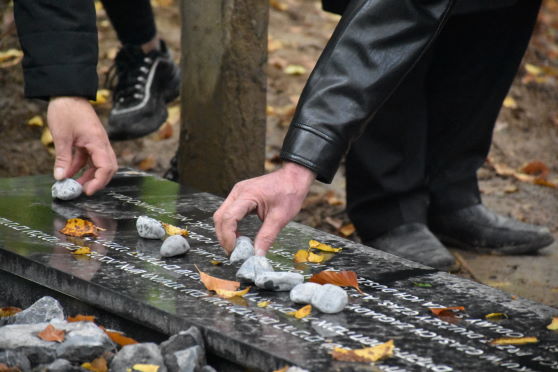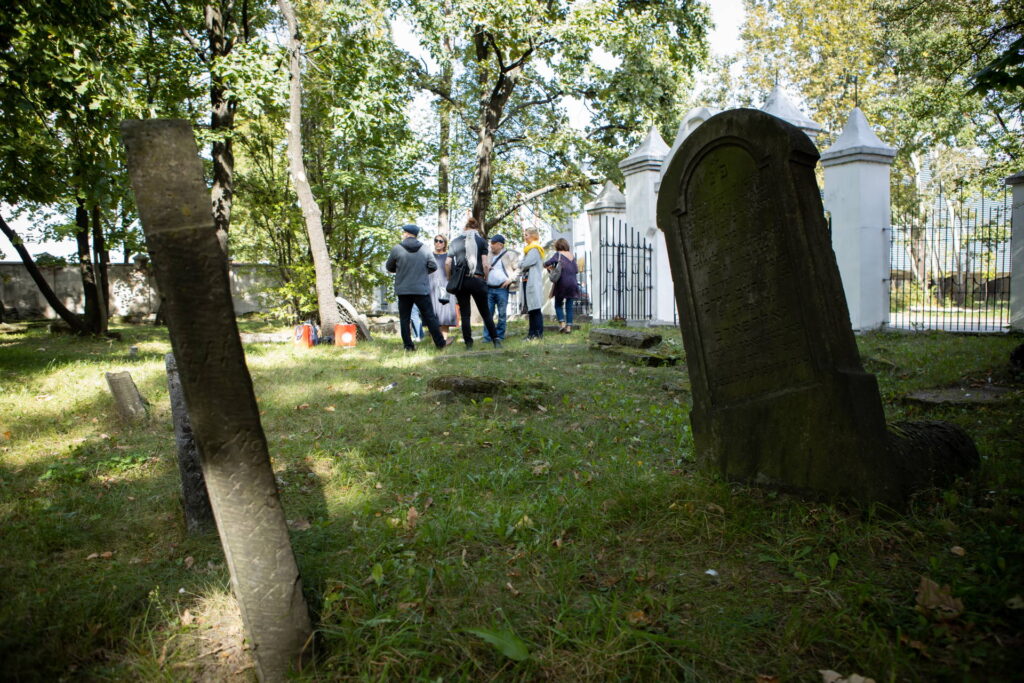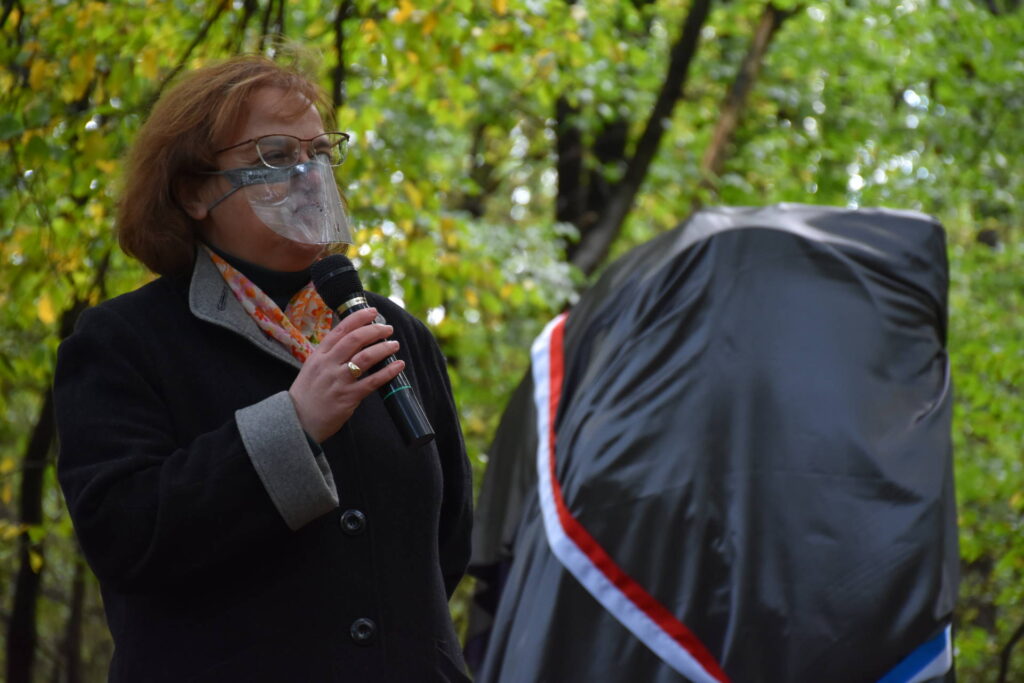
The growing community of the Leaders of Dialogue program members embodies another principal value of Forum for Dialogue’s mission – activism. It comes as no surprise that the pandemic initially challenged the formula of the program built around in-person activities and personal networking. But neither travel restrictions nor caps on public and private gatherings prevented the Leaders of Dialogue from commemorating local Jewish past and encouraging their neighbors to join in.
In early 2020, Forum for Dialogue began a brand-new initiative for Leaders of Dialogue, encouraging them to form regional support groups. The lockdown only accelerated the pace at which the groups coalesced. The shift towards remote collaboration proved to be a very effective and empowering way for Leaders of Dialogue to connect with others from the region, explore mutual needs, and hone skills together. Thus, soon after the four pilot groups from Lublin, Mazowsze, Podlasie, and Wielkopolska-Lubuskie regions kicked off in early spring, four subsequent groups formed in the summer in Łódź-Świętokrzyskie, Małopolska, Podkarpacie, as well as Śląsk-Opole regions. Co- sponsored by the Ledor Wador Foundation, all eight groups gathered 71 Leaders of Dialogue who made a joint effort to plan team-building and professional development activities.

I think that the idea of creating regional support groups is spot on, and works especially well for team-building and creating a great micro- community. During the pandemic, when larger meetings are ill-advised, small, local ones give us a chance to spend interesting time together.
Agata Radkowska-Parka, Leader of Dialogue from Lublin and Tomaszów Lubelski
Over the summer and early fall, when the number of COVID-19 cases in Poland was relatively low, Leaders of Dialogue did not hesitate to put at least some of their ideas into practice and use the energy they generated during remote meetings. The Lublin and Podlasie regional groups joined in the ceremony of the 79th anniversary of the Jedwabne pogrom. This was only the beginning of a cross-regional collaboration between both groups. Shortly after the ceremony, the Leaders from Podlasie invited their Lublin colleagues for a study visit of Jewish heritage in Białowieża, Milejczyce, and Orla. This joint project came then as a perfect occasion for the Leaders to better integrate with each other and boost their activist spirits together.
Equally, the Leaders of Dialogue continued their individual efforts to preserve, document, and popularize local Jewish heritage. To help them achieve their goals, Forum for Dialogue continued the grant and scholarship program co-financed by the Ledor Wador Foundation and The David and Anna Dlugie Kliger Scholarship Fund. We were honored to award seven Leaders of Dialogue by providing two institutional grants, five scholarships for local projects, and two scholarships for personal development.
Dariusz Popiela, a Leader of Dialogue and Olympic athlete from the Małopolska region continued his “People, not Numbers” project commemorating victims of the Holocaust in Czarny Dunajec and unveiling a monument on a local Jewish cemetery. Though due to the pandemic the descendants of local Jews could not participate in person, they remain involved and supportive of his efforts. Anita Rucioch-Gołek from Zbąszyń was awarded a grant to create together with her students a stop-motion animation, depicting prewar Jewish life of her town and maintaining relations with the descendants of Zbąszyń Jews. The recipient of two Forum scholarships, Urszula Antosz-Rekucka from Mszana Dolna worked to create an online archive of the local Jewish community. She was also planning a research trip to Israel to establish connections with descendants – postponed until safe travel resumes – and focused on online outreach in the meantime. Justyna Biernat published the first ever bilingual guide of the Tomasz Mazowiecki ghetto based on the archival research she has been conducting for years. Black Silhouettes: A Guide of the Tomaszów Ghetto is a much anticipated record of the wartime Jewish life of the town. Working in Brzesko, Anna Brzyska completed a monument commemorating the Jewish family killed in the village of Brzeźnica in 1944, while Marek Kołcon from Zamość and Jacek Koszczan from Dukla spent their personal development scholarships on English classes and tech equipment respectively. Despite the challenges posed by the pandemic, these activists quickly adapted to the new situation to ensure the success of these projects, while the Forum introduced a more flexible framework to help them adjust.

Together with our Jewish visitors we can speak out on the important universal topic that humanity is. We are human beings and we should see other people as human beings.
Wacław Wierzbieniec, Leader of Dialogue from Rzeszów
With their expertise in restoring Jewish past and building connections with the global Jewish community, in 2020 Leaders of Dialogue were frequent guests at our Zoom in on the Forum sessions, where they shared their knowledge and experience with our Polish and international friends, allies, and program participants. The feedback to these meetings was incredible, and the sentiment was also reflected in the numerous awards the Leaders were nominated to and granted by Polish and international institutions working in the field of Polish/Jewish dialogue. The ability to support the activism of these grass-roots guardians of memory is one of Forum’s greatest honors and a crucial task.
Step by step, by working in the archives, by meeting people, I found out that there is a great story to be told … Sometimes I feel all these no longer existent people are my friends and I know them because of their testimonies. This is the most important impulse and motivation.
Justyna Biernat, Leader of Dialogue from Tomaszów Mazowiecki
The Leaders of Dialogue program is co-financed by the Ledor Wador Foundation, Friends of the Forum, as well as private donors in Poland and abroad.